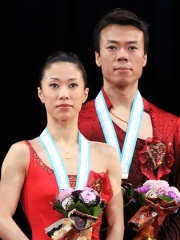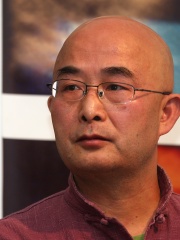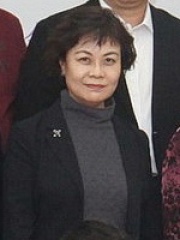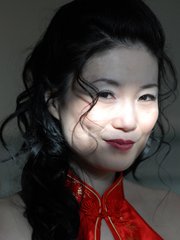Писатель
Shan Sa
1972 - настоящее время
RU.WIKIPEDIA PAGE VIEWS (PV)

 Shan Sa
Shan Sa
Её биография доступна на 21 различных языках в Википедии (рост с 20 в 2024 году). Shan Sa занимает 6536-е место среди самых популярных писатель (снижение с 6364-е места в 2024 году), занимает 1065-е место среди самых популярных биографий из Китайа (снижение с 1043-е места в 2019 году) и занимает 121-е место среди писатель Китай.
Memorability Metrics
Page views of Shan Sa by language
Among Писатель
Among писатель, Shan Sa ranks 6,536 out of 7,302. Before her are Anna Todd, Angie Sage, Emanuel Pastreich, Paul Laurence Dunbar, Amy Sherman-Palladino, and Mo Hayder. After her are Francisco Villarroel, Helle Helle, Peter Pišťanek, Sjón, Rose Tremain, and Tor Ulven.
Most Popular Писатель in Wikipedia
Go to all RankingsAnna Todd
1989 - Present
HPI: 49.73
Rank: 6,530
Angie Sage
1952 - Present
HPI: 49.73
Rank: 6,531
Emanuel Pastreich
1964 - Present
HPI: 49.73
Rank: 6,532
Paul Laurence Dunbar
1872 - 1906
HPI: 49.73
Rank: 6,533
Amy Sherman-Palladino
1966 - Present
HPI: 49.72
Rank: 6,534
Mo Hayder
1962 - 2021
HPI: 49.72
Rank: 6,535
Shan Sa
1972 - Present
HPI: 49.71
Rank: 6,536
Francisco Villarroel
1965 - Present
HPI: 49.71
Rank: 6,537
Helle Helle
1965 - Present
HPI: 49.69
Rank: 6,538
Peter Pišťanek
1960 - 2015
HPI: 49.68
Rank: 6,539
Sjón
1962 - Present
HPI: 49.68
Rank: 6,540
Rose Tremain
1943 - Present
HPI: 49.66
Rank: 6,541
Tor Ulven
1953 - 1995
HPI: 49.65
Rank: 6,542
Contemporaries
Among people born in 1972, Shan Sa ranks 470. Before her are Hiroyuki Takei, Jason Winston George, Brian Acton, Melissa Auf der Maur, Sammi Cheng, and Frode Estil. After her are Kevin Ullyett, Darius Kasparaitis, Khary Payton, Cléber Eduardo Arado, Kalinikos Kreanga, and Christophe Beck.
Others Born in 1972
Go to all RankingsHiroyuki Takei
COMIC ARTIST
1972 - Present
HPI: 49.85
Rank: 464
Jason Winston George
ACTOR
1972 - Present
HPI: 49.84
Rank: 465
Brian Acton
COMPUTER SCIENTIST
1972 - Present
HPI: 49.82
Rank: 466
Melissa Auf der Maur
ACTOR
1972 - Present
HPI: 49.78
Rank: 467
Sammi Cheng
SINGER
1972 - Present
HPI: 49.74
Rank: 468
Frode Estil
SKIER
1972 - Present
HPI: 49.73
Rank: 469
Shan Sa
WRITER
1972 - Present
HPI: 49.71
Rank: 470
Kevin Ullyett
TENNIS PLAYER
1972 - Present
HPI: 49.66
Rank: 471
Darius Kasparaitis
ATHLETE
1972 - Present
HPI: 49.62
Rank: 472
Khary Payton
ACTOR
1972 - Present
HPI: 49.59
Rank: 473
Cléber Eduardo Arado
SOCCER PLAYER
1972 - 2021
HPI: 49.58
Rank: 474
Kalinikos Kreanga
TABLE TENNIS PLAYER
1972 - Present
HPI: 49.53
Rank: 475
Christophe Beck
COMPOSER
1972 - Present
HPI: 49.53
Rank: 476
In Китай
Among people born in Китай, Shan Sa ranks 1,065 out of NaN. Before her are Sun-Yung Alice Chang (1948), Pauline Chan Bo-Lin (1973), Liang Wudong (1959), Zhai Zhigang (1966), Wei Wei (1963), and Raymond Lam (1979). After her are Huang Zhihong (1965), Zhang Jingchu (1980), Zhang Yuan (1963), Wu Jing (1974), Zhao Hongbo (1973), and Fei-Fei Li (1976).
Others born in Китай
Go to all RankingsSun-Yung Alice Chang
MATHEMATICIAN
1948 - Present
HPI: 49.87
Rank: 1,059
Pauline Chan Bo-Lin
ACTOR
1973 - 2002
HPI: 49.86
Rank: 1,060
Liang Wudong
PHYSICIAN
1959 - 2020
HPI: 49.79
Rank: 1,061
Zhai Zhigang
ASTRONAUT
1966 - Present
HPI: 49.76
Rank: 1,062
Wei Wei
SINGER
1963 - Present
HPI: 49.74
Rank: 1,063
Raymond Lam
ACTOR
1979 - Present
HPI: 49.72
Rank: 1,064
Shan Sa
WRITER
1972 - Present
HPI: 49.71
Rank: 1,065
Huang Zhihong
ATHLETE
1965 - Present
HPI: 49.71
Rank: 1,066
Zhang Jingchu
ACTOR
1980 - Present
HPI: 49.70
Rank: 1,067
Zhang Yuan
FILM DIRECTOR
1963 - Present
HPI: 49.65
Rank: 1,068
Wu Jing
ACTOR
1974 - Present
HPI: 49.65
Rank: 1,069
Zhao Hongbo
SKATER
1973 - Present
HPI: 49.63
Rank: 1,070
Fei-Fei Li
COMPUTER SCIENTIST
1976 - Present
HPI: 49.49
Rank: 1,071
Among Писатель In Китай
Among писатель born in Китай, Shan Sa ranks 121. Before her are Ma Jian (1953), Liao Yiwu (1958), Jiang Rong (1946), Su Tong (1963), Liu Xia (1961), and Ruth Graham (1920). After her are Chen Danqing (1953), Tie Ning (1957), Woeser (1966), Wei Hui (1973), Lulu Wang (1960), and Ken Liu (1976).
Ma Jian
1953 - Present
HPI: 53.32
Rank: 115
Liao Yiwu
1958 - Present
HPI: 52.70
Rank: 116
Jiang Rong
1946 - Present
HPI: 52.62
Rank: 117
Su Tong
1963 - Present
HPI: 52.22
Rank: 118
Liu Xia
1961 - Present
HPI: 51.73
Rank: 119
Ruth Graham
1920 - 2007
HPI: 50.31
Rank: 120
Shan Sa
1972 - Present
HPI: 49.71
Rank: 121
Chen Danqing
1953 - Present
HPI: 49.03
Rank: 122
Tie Ning
1957 - Present
HPI: 48.70
Rank: 123
Woeser
1966 - Present
HPI: 48.60
Rank: 124
Wei Hui
1973 - Present
HPI: 47.79
Rank: 125
Lulu Wang
1960 - Present
HPI: 47.02
Rank: 126
Ken Liu
1976 - Present
HPI: 45.87
Rank: 127
















































